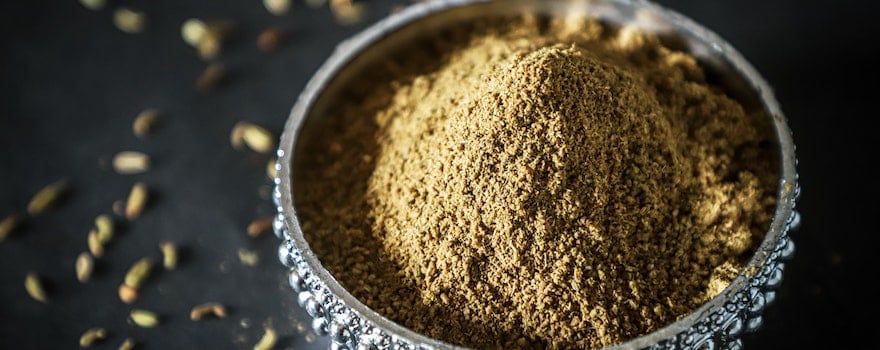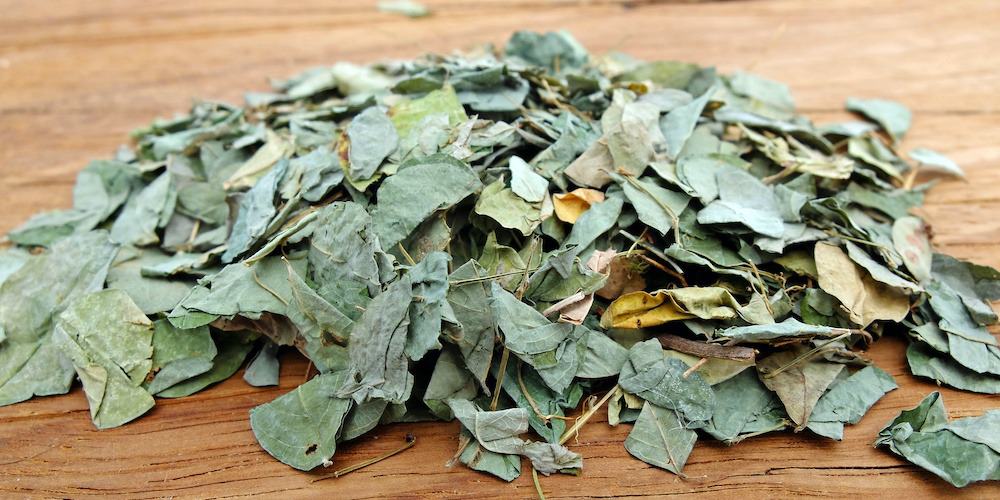BIENFAITS DU DESMODIUM
✓ Soutient le foie
✓ Antioxydante
✓ Anti-inflammatoire
✓ Soulage les allergies
✓ Potentiellement anti-cancer
What is desmodium?
Desmodium is a plant native to tropical forests. Like lupin and soy, it belongs to the fabaceae family. It grows in many regions worldwide: Africa, South America, Asia, Australia, and Oceania.
The botanical genus includes more than 300 different species. However, Desmodium adscendens and Desmodium gangeticum are recognized in phytotherapy and traditional medicine.
They hold a significant position in ayurveda. The aerial parts (leaves and stems) contain numerous active principles, such as antioxidants and unsaturated fatty acids.
Not to forget the proteins, minerals, and trace elements present in large quantities. This composition gives desmodium various benefits for the body.
Studies show its beneficial effect on liver functions. Thus, it supports the liver and helps in the drainage of toxins.
It is also antioxidant and anti-inflammatory. Finally, it is useful for relieving allergies and potentially anti-cancer.
Read also | Advice from a pharmacist on choosing a liver dietary supplement
Long used by local populations, desmodium was introduced to France in the 1970s. Dr. Pierre Tubéry was the first to take an interest in the properties of the plant, later joined by many scientific researchers.

Nutritional Composition
- Minerals and trace elements : sulfur, calcium, copper, phosphorus, iron, magnesium, potassium, silicon, sodium, zinc
- Proteins
- Fatty acids
- Antioxidant actives: flavonoids, alkaloids, isoflavones, anthocyanins
- Saponosides
The benefits of desmodium
💎 Supports the liver
As a liver ally, it supports hepatic functions. It ensures the proper functioning of this emunctory organ, responsible for filtering and eliminating toxins from the body.
It is ideal for ridding the body of toxic substances: drugs, heavy metals, insecticides… It helps tired livers regain their elimination function.
At the same time, it is hepatoprotective. It is indicated for viral hepatitis or cirrhosis as it increases cell resistance and regenerates them.
This study by KLE University’s College of Pharmacy (India), conducted on rats, shows the hepatoprotective role of desmodium.
🥝 Antioxidant
The leaves and stems of the plant contain powerful antioxidants. Thus, there are alkaloids, flavonoids, isoflavones, and anthocyanins. All fight against free radicals that damage cells and accelerate aging.
Like yarrow, it contains vitexin. This substance regulates the transcription factor Nrf2, which combats free radicals and stimulates the production of antioxidant enzymes in the body.
This study by India’s National Botanical Research Institute, conducted on rats, shows the antioxidant activity of desmodium.
🔥 Anti-inflammatory
Its consumption is beneficial for reducing inflammation. Indeed, it contains saponosides, natural molecules with anti-inflammatory properties. It notably helps relieve liver inflammation due to drug intoxication or hepatitis.
This action is associated with an analgesic effect. It soothes joint pain, muscle cramps, cramps (spasms…), and back pain.
This study by China’s Medical University, conducted on mice, shows the anti-inflammatory and analgesic action of desmodium.
🤧 Relieves allergies
Desmodium is indicated for the treatment of asthma. It reduces the inflammation and spasms of the bronchi that characterize this disease. It does so by interfering with spasmogenic substances (leukotrienes) that cause bronchial muscle contraction.
The plant also inhibits the action of histamine which triggers the allergic response. It is useful for relieving respiratory (rhinitis, sinusitis…) and food allergies.
This study from the University of Ghana, conducted on guinea pigs, shows the beneficial effect of desmodium on allergies.
🔬 Potentially anti-cancer
Thanks to its antioxidant properties, it shows potential against cancer. By exerting a protective and regenerative effect on liver cells, it prevents liver cancer.
Moreover, it protects the liver from the adverse effects of chemotherapy. It relieves pain and fatigue in patients.
This study from the Marche Nord Hospital in Fano (Italy), conducted on cancer patients, highlights the role of desmodium in alleviating their symptoms.

How to consume desmodium?
Desmodium in capsules
The capsules are made from dried aerial parts (leaves and stems) ground into powder. Convenient and easy to take, they have the advantage of being tasteless.
Indeed, desmodium powder has a rather strong taste that not everyone likes. It is an easy format to find in stores, specialty shops or online.
Choose a dietary supplement sufficiently dosed. It should be standardized to at least 2% vitexin. Also, prefer plant-based capsules.
Desmodium in powder form
The powder easily mixes in a glass of water, fruit juice, plant milk, or a hot beverage. You can also add it to applesauce, yogurt or sprinkle it on a salad.
But beware: it has a rather unpleasant taste and smell.
Dried desmodium leaves
Dried leaves are consumed as tea. This infusion helps to purify and cleanse the body. It has a mild but distinctive taste.
Infuse 10 g of leaves in 1 L of boiling water for 15 minutes. Strain and enjoy your tea hot or cold, at any time of the day. You can sweeten it with honey or lucuma powder.
Desmodium as mother tincture
The mother tincture is obtained by hydro-alcoholic extraction of the aerial parts of the plant. This format is concentrated in active substances but contains alcohol. It is thus not recommended for pregnant women, children, or people with certain conditions.

Sustainable consumption: opt for organic and fair-trade desmodium
✓ La plante est produite dans de nombreux pays d’Afrique (Gabon, Ghana, Cameroun…), d’Amérique du Sud (Pérou, Bolivie, Équateur…) et d’Asie (Inde, Japon, Vietnam…). Les plantations se développent aussi à Madagascar. Son origine peut donc être très variée.
✓ Si vous le pouvez, privilégiez du desmodium cultivé en agriculture biologique. Il existe aussi des filières équitables qui soutiennent le travail des petits producteurs.
Dosage
The recommended dosage is 8 to 10 g of desmodium per day.
Contraindications and side effects
The consumption of desmodium presents certain contraindications:
- As a precaution, it is not recommended for pregnant and breastfeeding women and young children;
- Desmodium can interact with certain medications. Consult your doctor if you are on medication.
The consumption of desmodium presents certain side effects:
- Digestive disorders
- Nausea
- Diarrhea
If you experience side effects, stop usage and consult a doctor.
Sources and scientific studies
Subha Rastogi, Madan Mohan Pandey, Ajay Kumar Singh Rawat, 2011. An ethnomedicinal, phytochemical and pharmacological profile of Desmodium gangeticum (L.) DC. and Desmodium adscendens (Sw.) DC.
G A Kalyani, C K Ramesh, V Krishna, 2011. Hepatoprotective and Antioxidant Activities of Desmodium Triquetrum DC.
Raghavan Govindarajan, Subha Rastogi, Madhavan Vijayakumar, Annie Shirwaikar, Ajay Kumar Singh Rawat, Shanta Mehrotra, Palpu Pushpangadan, 2003. Studies on the antioxidant activities of Desmodium gangeticum.
Shang-Chih Lai, Wen-Huang Peng, Shun-Chieh Huang, Yu-Ling Ho, Tai-Hung Huang, Zhen-Rung Lai, Yuan-Shiun Chang, 2009. Analgesic and anti-inflammatory activities of methanol extract from Desmodium triflorum DC in mice.
M.E.Addy, E.M.K.Awumey, 1984. Effects of the extracts of Desmodium adscendens on anaphylaxis.
Luca Imperatori, Damiano Giardini, Gino Latini, Giuseppe Migliori, Claudio Blasi, Feisal Bunkheila, Cesare Breschi, Rodolfo Mattioli, Silvia Pelliccioni, Carmen Laurino, Maria Vadalà, Beniamino Palmieri, Tommaso Iannitti, 2018. Feasibility single-arm study of a medical device containing Desmodium adscendens and Lithothamnium calcareum combined with chemotherapy in head and neck cancer patients.



